1. His Personality
I’ll admit it. I’m a sucker for the sweet, innocent and naïve cinnamon roll characters. And that’s exactly what Luke is. In fact, Luke is the perfect example of a personality type often compared to cinnamon rolls too good for this world – ENFJs. I’ve always been particularly fond of ENFJs. They’re independent, adventurous, ambitious, often bossy, but ultimately driven by an overload of Fe – a cognitive function in MBTI personality types that gives people a constant need to be helpful or protect or save someone. Their Fe is like motivational insanity that can make them disregard all else. “Someone I love is in trouble? LET’S GO. What do you mean I’ll be in danger if I go? I don’t know what danger is. MUST RESCUE RESCUE RESCUE.” It’s very like them to jump blindly into crazy, dangerous situations to save someone else, with barely any thought about themselves or if this is even a good idea – and then win. And then, after they’ve won, to not even really notice that they’ve won, or realize the insane odds they just beat. “JUST AS LONG AS LOVED ONE IS SAFE.”
In fact, Luke is one of the most Fe-ish characters I’ve ever seen. He’s basically the ultimate burning emblem of Fe, unashamedly driven and consumed by it. I mean, there are characters out there who appear more Fe-ish. Characters who are more outwardly warm and parental and whatnot. But no one else is so ultimately defined by their Fe, with their identity and motivations so rooted in Fe, as Luke is. Whether he’s going off on a crazy mission to please his new mentor Obi-Wan and honor the memory of his father, disobeying Yoda’s instructions to go rescue his friends, temporarily risking going to the dark side out of a desire to protect his sister, or choosing not to fight in order to redeem his father, everything he does is ultimately motivated by his desire to please or protect someone else.
(Source: skywalkcrs.tumblr.com)
I’ve seen Luke accused of being all sorts of things from “whiny” to “clueless.” And while I think I know where such accusations are coming from, I’ve gotten a slightly different impression of such things. What’s more, they are very in line with what one would expect from someone of his age in his circumstances. Luke is very young, and he’s never known life outside the chores and everyday drudge of work on a farm. He’s an extrovert growing restless after being forced his whole life to cope with the very solitary life out in the desert.
(Source: luciusmafoy.tumblr.com)
The only social life he’s known are the few people he’s run into at Tosche Station, most of whom (as we’re shown in a deleted scene) aren’t very interested in talking to him. He doesn’t understand people yet. He’s spent his entire life extremely sheltered by his aunt and uncle. And his lack of experience causes him to be very naïve, often treading into “endearingly stupid” territory. Luke is still trying to fully understand the world he’s been placed in when tragedy suddenly throws him into a new one.
(Source: winchestheart.tumblr.com)
(Source: ianmckllen.tumblr.com)
He doesn’t face this new world with snark and narcissistic overconfidence as the case is with many protagonists these days (e.g. Iron Man, Captain Jack Sparrow, Star Lord, etc.), but he also doesn’t just wander around helplessly, wide-eyed and wonder struck. He shows initiative, though often in all the wrong ways. He has a very Gryffindor-like zeal, wanting to help, but instead being bossy; wanting to prove himself, but instead rushing head-first into situations he doesn’t understand yet. He grows and learns in a very hands-on way, making mistakes along the way.
(Source: Tumblr)
The amazing thing about Luke is, despite all his naïveté and inexperience, he still manages to win just with sheer determination. From Han and Luke winging their way through their rescue of Leia, to finding a tiny weakness that can blow up the entire death star, to ewoks destroying the empire’s AT-STs, a common theme in the Star Wars movies are big, powerful things being defeated in the humblest of ways. And Luke embodies that theme so much, which I love. As one of my favorite Tumblr quotes about Luke says, “God, he’s so young. Like this impossible creature of wisdom and naïvete. Luke is just so much: fierce and over-earnest and full of zeal. Drawling smirking mercenaries are easier to love; Luke is something else.”
(Source: godyoutalkpretty.tumblr.com)
2. His Unique Character Arc
All fictional characters fit into some kind of classic trope. Some character follow the pattern of that trope to the letter, while others find a way to break that pattern and add something unique to the mix. Either of these can be done well. For example, Han Solo fits the “charming rogue who secretly has a heart of gold” trope. It’s a very successful trope in fiction, and Han Solo becomes a good character by following its pattern pretty much to the letter. There’s not really anything unique about his arc, per se. It pretty much feels like the same thing as always. It’s “the same thing as always” done particularly well, but still the same thing as always. So, there’s definitely nothing wrong with following the pattern of a trope. Having said that, I find it much more interesting when a story finds a way to be surprising and throws in something unexpected.
Luke belongs to the “young everyman who gets caught up in a hero’s journey” trope. But his character arc goes against this trope’s pattern in many ways, becoming something very unique. Besides some unique elements about his character arc that I will discuss later in the article, examples include the following:
• While most adventurer MCs are reckless because they are always living in the present moment, never looking ahead or considering consequences, Yoda says Luke is reckless for the exact opposite reasons – because he is always looking ahead instead of paying attention to the moment at hand.
(Source: leialuke-archive.tumblr.com)
• Even though most main male characters “get the girl” at the end, the girl he loved ended up being his sister and fell in love with someone else while he remained single until the end of the films.
(Source: daisyrildey.tumblr.com)
• Even though he’s an action hero, he wins by choosing not to fight, and instead chooses to save the villain so that the villain will send his own evil empire crumbling down.
(Source: skywalkcrs.tumblr.com)
Not only is his story done well, it goes in places you don’t expect.
3. His Complex Motivational Arc
Luke has one of the most tumultuous motivational arcs I’ve seen in an action/fantasy franchise. His Fe (and, along with it, his life purpose) is constantly being forcefully shifted without any way for him to stop or control it. Hardly any time passes before it ends up shifting yet AGAIN. For example:
• Life Purpose: Please his aunt and uncle.
• They die.
• Life Purpose: Please new mentor, Obi Wan.
• He dies.
• Life Purpose: Honor the great legacy of his father by becoming a Jedi.
• It turns out his father’s legacy was a lie. His father is actually evil and trying to kill his new friends.
• Life Purpose: Save new friends.
• It turns out trying to save new friends just makes things worse, and they are all about to die and there’s no way he can stop it.
• Life Purpose: Redeem father who has turned evil.
• Success? Yes!!! What to have as a Life Purpose now? …Ah! I know!
• Life Purpose: Protect newly redeemed father.
(Seriously, Luke will stay on board a ship he knows is about to be destroyed just to stay by his father’s side.)
…And he dies.
Characters are so often defined by their goals in stories, it’s interesting to see someone whose goals constantly change. Instead of knowing Luke by what he’s trying to do, we get to know him simply as a person and take the journey with him as he navigates his own ever-shifting agenda.
4. His Mystery and Morally Ambiguous Virtue
Previous readers of this blog might have guessed during my Star Wars Commentary that I’m not a huge fan of the Jedis or their philosophies. I’ve already talked a lot about how they deny vital parts of humanity and how they have displayed hypocrisy, impatience, and unfair judgment. But while I’m not personally fond of how this whole religion about the Force works, it does serve to make Luke’s story really unique. What it ends up doing is making Luke a morally ambiguous character, despite the fact that he doesn’t make morally ambiguous choices. Even though he’s good, he isn’t what the other good characters want him to be. And there’s such a question mark over whether he’ll ultimately be on the light or dark side. When I try to envision Luke’s morality or potential path before he’s tested by the Emperor, it’s like looking at Schrodinger’s Cat. But instead of shifting between good and evil, it feels more like it’s shifting between absolute good and good/evil. The possibility of evil in him is so small and yet so present. And the good in him is so solid, so indestructible, that if he did turn evil, I know it would be his desire for good that would lead him there and the purpose of his evil actions would be to bring about some good.
Most characters become morally ambiguous because of their questionable ethics – acting selfish, lacking empathy, employing trickery, or sacrificing other people for the “greater good”. But Luke isn’t any of those things. His main drive is selflessness and empathy, he’s honest and open, and his main “fault” in the second film was that he wouldn't sacrifice others for the greater good. And that’s what I find so interesting: Luke is morally ambiguous not because of how his own morality is set up but because of how the morality of this world is set up – their religion and the nature of the Force. And according to that religion, Luke’s ideals are gray in what is otherwise a very black and white world. And even though it’s a good gray, just the fact that it’s not what this world considers “white” puts him at risk for becoming what this world considers “black”.
(Source: twinklingbucky.tumblr.com)
Since this world’s version of morality is built on the idea that some virtues (calm temperament, clarity of mind, a strong connection the universe around us) are good while other virtues (passion, love, loyalty to friends, a sense of adventure) are bad and places ideals above people, the rightness of this world’s morality is at least subjective. We have to remember that just because a “wise” character on the movie says something is right or wrong, that doesn’t mean we, the viewer, have to take their word for it. Their right might actually be wrong, and Luke’s right could be correct instead. Or they might both be wrong. Or a mixture.
Because Luke has been made into a gray character who can easily tilt into white or black territory, this makes him something of a wildcard. You don’t know what side he’ll ultimately be on or even what side you really want him to be on. Personally, I want him to always just be on his own side. The dark side of the force is obviously evil. But the light side, I think, is pretty misguided. Whereas, I believe in Luke’s grayness.
5. His Neutral Good Alignment
One thing that makes Luke’s story so interesting is it’s one of the few I‘ve seen that actually explores the complex nature of the Neutral Good alignment. Neutral Good people have their own code of virtues (usually rooted in Fe – justice, mercy, and helping other people) and their own personal goals based on that code. Unlike, say, Chaotic Good people, they do their best to reach their goals while still working within the law or within the moral framework of the people and culture around them. But at the end of the day, if that law or that framework stops them from reaching their goals, they won’t hesitate to step completely outside those boundaries and do what they believe needs doing. While they greatly respect other people’s morality and will honor it if they can, their own code ultimately takes precedence over other people’s.
Neutral Good is very interesting because it’s very independent and somewhat rebellious but never too morally questionable. And that’s not an alignment I see portrayed well too often in media. Usually the characters I see in mainstream media are one of three extreme things. Either they’re a very righteous Lawful Good hero who stands up for always following the law to the letter and respecting/obeying people in charge of you and believing 100% in the ideals your betters teach you; or they’re a standard Evil villain who crushes all goodness while pursuing their own evil desires; or they’re some really extreme Chaotic Good/Chaotic Neutral character, dripping with rebellion and snark, breaking every rule they can while still being vaguely on the side of good (or at least having a lot of redeemable qualities). Neutral Good, on the other hand, is this calm, quietly rebellious alignment situated right between the Lawful Good and vaguely good Chaotic ones. It’s not, in any way, an extreme. And I think that’s why most filmmakers either don’t think about it or just aren’t interested in it. Since it’s not an extreme, they think people won’t take to it. But it is far more real and complex than the extreme alignments in my opinion, and way more interesting than people give it credit for.
Like most Neutral Good people, Luke isn’t really driven by loyalty to any side or by any ideology. He’s driven solely by his personal moral code, his desire to help/save people, his Fe. It drowns out all the issues for him that most other characters in this universe think about, such as politics and war and loyalty to certain philosophies. In fact, one really important thing about Luke that a lot of people don’t realize is just how apolitical he is. I’ve read/watched a lot of interviews about the creation of Luke’s character. And one thing that was apparently really important to the cast and crew to drive home is how little allegiance he has to any particular side. Unfortunately, a lot of the scenes they made to drive this home to viewers had to be cut due to time constraints. But one scene even showed Luke considering joining with the Empire because he had a friend who had done so. He didn’t care or stop to think about the philosophical implications of joining the Empire or helping them do what they do. All he knew was that he cared about his friend and wanted to join up with him.
And ultimately, it’s the same with his joining up with the rebellion and the Jedis too. He doesn’t have any particular passion for their cause or beliefs. In fact, all he knows of them is what Obi-Wan told him in one short conversation he was barely paying attention to. All he knows is he cares about Obi Wan and wants to follow him, and he cares about his father (or what he believed his father to be at the time) and wants to do something that would have made him proud. Luke isn’t about politics or ideologies or taking sides in anything. He’s willing to join up with a side, but deep down, his heart isn’t loyal to that side. And the only reason he joins up with a side in the first place is because someone he loves has done so and he wants to follow them so he can be around them or help/protect them.
I think the scene where the Emperor tries to turn Luke to the dark side but Luke resists the temptation and helps redeem his father instead is one you really have to watch in light of all that. A lot of people don’t, and I think that leads them to misunderstand the scene. A lot of people think, “Luke is a good guy but also kind of reckless and didn’t always listen to Yoda when he should. He makes mistakes, such as the time he was supposed to stay and train and instead went off to save his friends. But when tempted by the Emperor, Luke ultimately resists. Instead, he chooses to embrace the teachings Yoda taught him and accepts the way of the Jedis, helping redeem his father in the process.” While some of that’s true, it’s also much more complicated than that. While Luke does become a Jedi, I think he still has not fully embraced their philosophies the way Yoda would have wanted and instead still relies on his own moral code. In fact, in this regard, I don’t think Luke is particularly changed by the end of the movies. For example, if he was again presented with the choice to stay for more training as Yoda wishes or go save his friends, I believe he would once again choose to save his friends. He still has the same mindset and priorities he’s always had.
When given the choice between saving someone or doing “the right thing,” Luke will choose to save someone. Because, to him, saving someone is the right thing. Always. Even when others disagree and believe sacrificing others is necessary for the greater good. Because what’s the point of doing what others see as good if it means letting people die or failing people who count solely on you? What’s the point of living as a “good person” if you have to live without the people you love? Sure, the idea of going to the dark side scares him, makes him hesitate. Which is what we see him do when he sees his father’s hand and realizes he might be following Vader’s path.
(Source: padme4president.tumblr.com)
He definitely doesn’t want to be evil, and the possibility of turning evil is definitely making him cautious. But if the choice here was genuinely between going to the dark side while saving someone, or staying on the light side while letting people die, I think it would only be a matter of time before he went to the dark side (though I don’t think he would do so on the Emperor’s terms or view the Emperor as his master).
As I’ve said before, everything he does is completely dictated by his Fe. When the Emperor’s plan starts to work a little and they finally get Luke fighting Vader, it’s because Luke’s Fe kicks in and he’ll do anything to protect Leia. When Luke decides not to fight anymore, it isn’t because he’s conquered his Fe and realizes that “doing the right thing” is more important than saving Leia. Only by stepping back for a second and transferring his Fe to his desire to save his father does he stop himself from going to the dark side. But what would have happened if the person he was fighting wasn’t his father? What if it was someone he had no desire to save? I think there’s a very good chance he might have turned in such a case.
(Source: theforcesource.tumblr.com)
The reason he doesn’t go to the dark side is not because he’s ~so devoted~ to the light side of the force. I think, even to the end, he has that subconscious lack of allegiance to anything other than individuals he cares for. Rather, his resistance to being turned is because, in this particular case, going to the dark side would require him to give up trying to redeem his father, fight his father, and kill him. And he wants to save his father. That’s the point. It will never be about what side he’s on. It will always be about saving someone. Everything else – his morality and allegiances – will always be a question mark because it all depends on what he has to do in each situation to save whoever he wants to save.
6. His Determination To Love Others
In many ways, Luke remaining on the good side is due to luck and circumstances. But I also think it’s more than that. When something – even bad choices – is done out of love, it’s really hard to corrupt. Even Vader, who was turned to the dark side through his love for Padme, is not as firmly on the dark side as people think. He expressed a wish for the Emperor to be defeated in the second film, Luke senses strong goodness in him, and his love for his son (as well as his son’s love for him) ultimately turns him back to the good side again.
(Source: aaronpaauls.tumblr.com)
Love is such an inherently good thing that, even though it can be used to make people do bad things or even align with the bad side, sustaining that badness is very difficult because it was born out of a natural desire to do good. And I think that, while there is definitely a lot of risk involved with it, the way Luke’s morality is built is just so rooted in love that it gives him a sort of protection that others might not have. In fact, in many ways I think who he is – including the parts Yoda disapproved of – makes him more resistant to evil than what Yoda wanted him to become.
(Source: leialuke-archive.tumblr.com)
Lawful-aligned characters like Yoda definitely give an appearance of absolute righteousness and responsibility. But because his philosophies place ideals over caring for other people, that makes his focus ultimately inward on himself instead of outward. It’s all about his own growth, his own beliefs, his own feelings. When Yoda does something good he either does it out of duty, because he believes he’s “supposed” to, or he does it for himself because he wants to be a good person and wants to be on the good side of the force. Whereas, what’s very interesting about Luke is that the times he’s the most good is not when he’s trying to be good. It’s not when he’s mentally fighting the Emperor, trying to hold onto everything the Jedis have taught him. It’s not when he’s focused on himself, trying to control his emotions. The times he’s the most good is when he’s not trying at all, when he’s not even thinking about it, when his mind switches from himself and his morals to instead thinking about his father, wanting his father to be redeemed.
Luke’s goodness is built on taking his mind off himself and putting it on other people. And that’s why I prefer it. It’s about empathy and love. He’s not good because he wants to be; he doesn’t do good because he feels it’s his “duty.” It’s just natural. There’s such a genuine purity about it. And I think that’s why, no matter what sides (good or bad) he’d join up with in his efforts to save people, he will always end up on the good side in the end. I think that’s why, more than just because of luck, he ended up on the good side in these films. His redeeming Fe doesn’t just save his father. It saves him too.
(Source: luciusmafoy.tumblr.com)


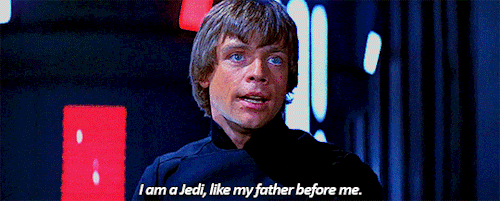
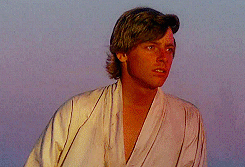
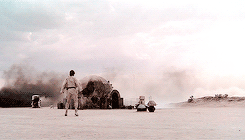
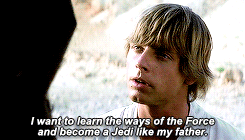
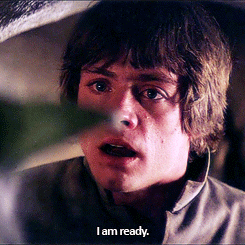
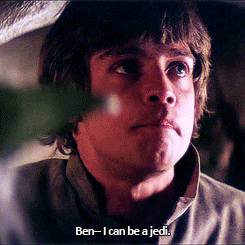


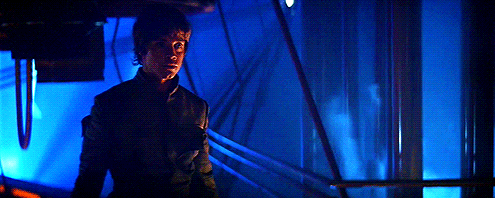
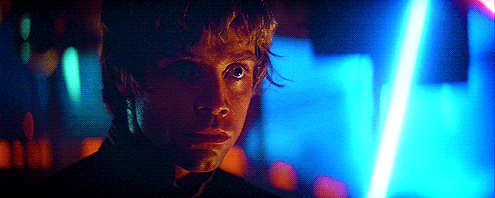

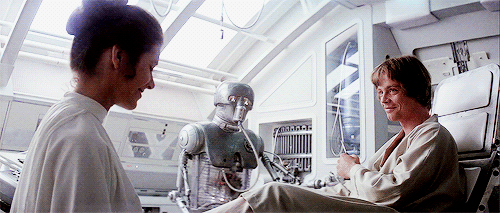
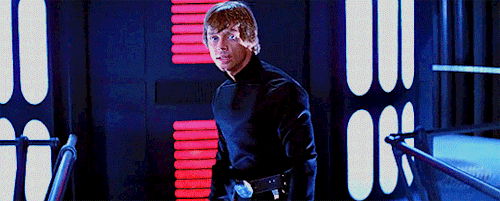


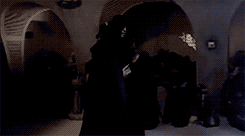

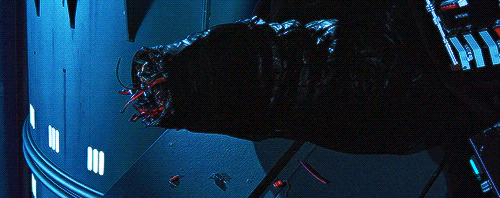
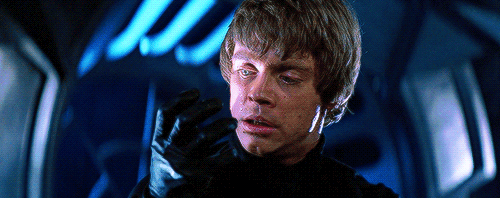
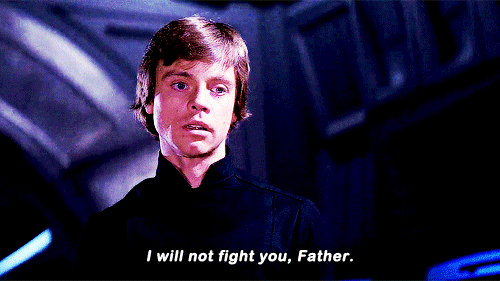
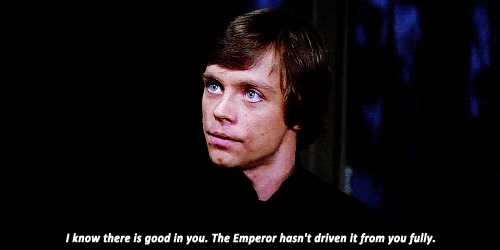

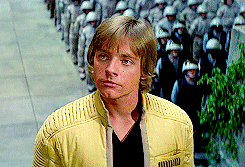


I think for me I loved both Han and Luke equally when I first watched these movies. Sure, Han was pretty good looking and he gets the girl. But Luke was, in your words, the sweet, innocent cinnamon roll. (I was also a big fan of young Anakin to the point of embarrassment from my siblings.) I think I liked both because they were both unique & had their own stories. They both became heroes, but in different ways. I know I hated the end of Ep. VI when the Emperor force lightning Luke--I wanted to cry.
ReplyDeleteThis post exemplifies why Luke is the hero of the story. I love it. :) I'm stoked to see what they do with him next. (Plus, Mark Hamill is brilliant.)
This was wonderful! Thank you for writing it and sharing it with us. Luke rules!
ReplyDeleteI have enjoyed reading your post. This helps explain some of the things that happened with Luke in Star Wars VIII. It makes more sense now, though I hate to see him struggle so much.
ReplyDelete